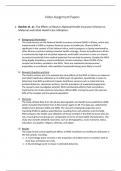Video Assignment Papers
1. Bonfrer et. al.: The Effects of Ghana’s National Health Insurance Scheme on
Maternal and Infant Health Care Utilization:
a) Background Information:
The study focuses on the National Health Insurance Scheme (NHIS) in Ghana, which was
implemented in 2004 to improve financial access to healthcare. Ghana's NHIS is
significant in the context of Sub-Saharan Africa, and its progress is closely monitored by
other African countries seeking universal health coverage. Access to healthcare in Africa
is constrained by high out-of-pocket expenses, and health insurance is seen as a means
to protect households from medical expenses that can lead to poverty. Despite the NHIS
being legally mandatory, actual enrollment remains voluntary. About 39.8% of the
sample had mothers enrolled in the NHIS. There are substantial socioeconomic
inequalities in enrollment, with wealthier households being more likely to enroll.
b) Research Question and Aim:
The study's primary aim is to evaluate the early effects of the NHIS in Ghana on maternal
and infant healthcare utilization in its initial years of operation. Specifically, it seeks to
determine how NHIS enrollment impacts healthcare services such as antenatal care,
assisted deliveries, caesarean sections, and the prevalence of unwanted pregnancies.
The research also investigates whether NHIS membership affects child vaccinations.
Importantly, the study examines how these effects differ among the poor (the poorest
40% of the sample) and the general population.
c) Methods:
The study utilized data from the Ghana Demographic and Health Survey (GDHS) in 2008,
which included information from 4,916 women aged 15-49. The data was collected for
children born between 2003 and 2008. The research employed propensity score
matching (PSM) to address potential bias resulting from self-selection into the NHIS.
PSM compares the health care utilization of those enrolled in the NHIS to those who are
not, ensuring the two groups are comparable in terms of observable characteristics. The
study also includes detailed covariates, such as demographics, socio-economic status,
education, occupation, religion, ethnicity, and region.
d) Results:
The study found several significant effects of NHIS enrollment on healthcare utilization in
the full sample, including:
A 7 percentage point increase in the proportion of children born to mothers with at
least four antenatal care visits.
A 10 percentage point increase in attended deliveries.
, A 6 percentage point increase in caesarean sections.
A 7 percentage point reduction in the number of children born from unwanted
pregnancies.
However, NHIS enrollment had almost no effect on child vaccinations. Among the poorest 40%
of the sample (the "poor"), the effects were generally similar for antenatal care and attended
deliveries, but the effect on caesarean sections was about half the size, and the reduction in
unwanted pregnancies was larger compared to the full sample.
In summary, in the early years of operation, the NHIS had a modest impact on the use of
antenatal and delivery care in Ghana, which is important for other African countries considering
similar national health insurance schemes.
2. Capuno et.al.: Effects of Interventions to Raise Voluntary Enrollment in a Social
Health Insurance Scheme
a) Background Information:
The study focuses on the challenge of extending health coverage to informal-sector
workers in developing countries. These workers are typically self-employed and mobile,
making it difficult to include them in universal health coverage (UHC) efforts. Some
countries provide partial subsidies to encourage enrollment, but growth in enrollment
among the informal sector has been sluggish in many places, particularly in the
Philippines. The research aims to explore cost-effective measures to increase voluntary
enrollment rates among this group.
b) Research Question and Aim:
The research question revolves around identifying effective strategies to boost voluntary
enrollment rates for informal-sector workers and move closer to achieving UHC. The
primary aim is to investigate the impact of a combination of information and premium
subsidies (Intervention I) on enrollment in the government-run Individual Payer Program
(IPP) in the Philippines. Additionally, the study seeks to understand the effects of
measures designed to simplify the enrollment process (Intervention III) on non-
compliant families within the informal sector.
c) Methods:
The study is based on two randomized experiments conducted in the Philippines. The
first experiment involves treatment (Intervention I) and control groups, with the
treatment group receiving information kits, insurance vouchers, and SMS messages to
increase enrollment. The second experiment (Intervention III) targets non-compliant
families within the informal sector and involves the home visit, assistance with
completing enrollment forms, and the delivery of these forms to the government health
office.




